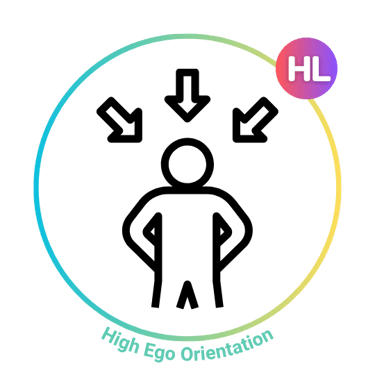





Overview
In the context of sport psychology, high ego orientation refers to athletes who primarily define success by outperforming others and demonstrating superior ability. While this drive for external recognition can motivate some individuals to train and compete at high levels, it can become problematic when not balanced by strong task orientation, that is, a focus on learning, effort, and personal improvement.
When athletes have a high ego orientation but low task orientation, their motivation is tied almost entirely to comparison and outcome. They feel successful only when they win or appear better than others. However, when faced with stronger opponents, difficult tasks, or the possibility of failure, these athletes may experience performance anxiety, reduced motivation, or fear of failure. They may avoid challenges altogether if they believe they cannot come out on top, as losing threatens their self-worth.
Without a task-oriented mindset to anchor them in self-referenced progress, high ego-oriented athletes are less likely to value effort for its own sake. For example, if a runner consistently finishes second despite improving their time, a low task-oriented mindset may lead them to feel like a failure, even though their personal performance is improving. This narrow definition of success makes it harder to stay motivated when results don’t go their way.
Furthermore, this imbalance can lead to:
Increased stress and pressure to perform perfectly
Avoidance of difficult tasks or opponents to protect their status
Reduced enjoyment of sport when winning is not guaranteed
Greater vulnerability to burnout when external validation fades
In contrast, athletes who balance high ego orientation with strong task orientation are more likely to maintain motivation and resilience. They can still enjoy competition and the desire to win, but also value improvement, learning, and effort. This balance provides a buffer against the emotional swings of wins and losses, enabling athletes to adapt, recover from setbacks, and maintain focus on long-term growth.
Coaches can help athletes develop this balance by:
Encouraging goal-setting that includes process and performance goals, not just outcomes
Providing feedback that highlights effort, improvement, and learning
Creating a team culture that values development over dominance
Supporting athletes in reflecting on their own progress, not just their ranking
In summary, high ego orientation becomes problematic when it is not supported by task orientation. Without an internal focus on learning and effort, athletes are more likely to experience emotional instability, reduced motivation, and performance issues when they don’t win. Building a balanced motivational profile is essential for long-term success, well-being, and satisfaction in sport.






